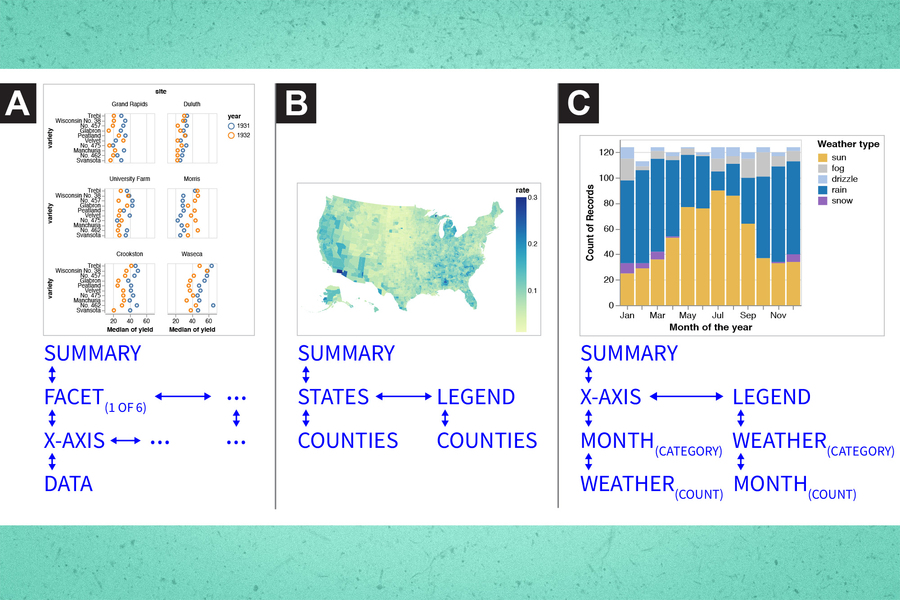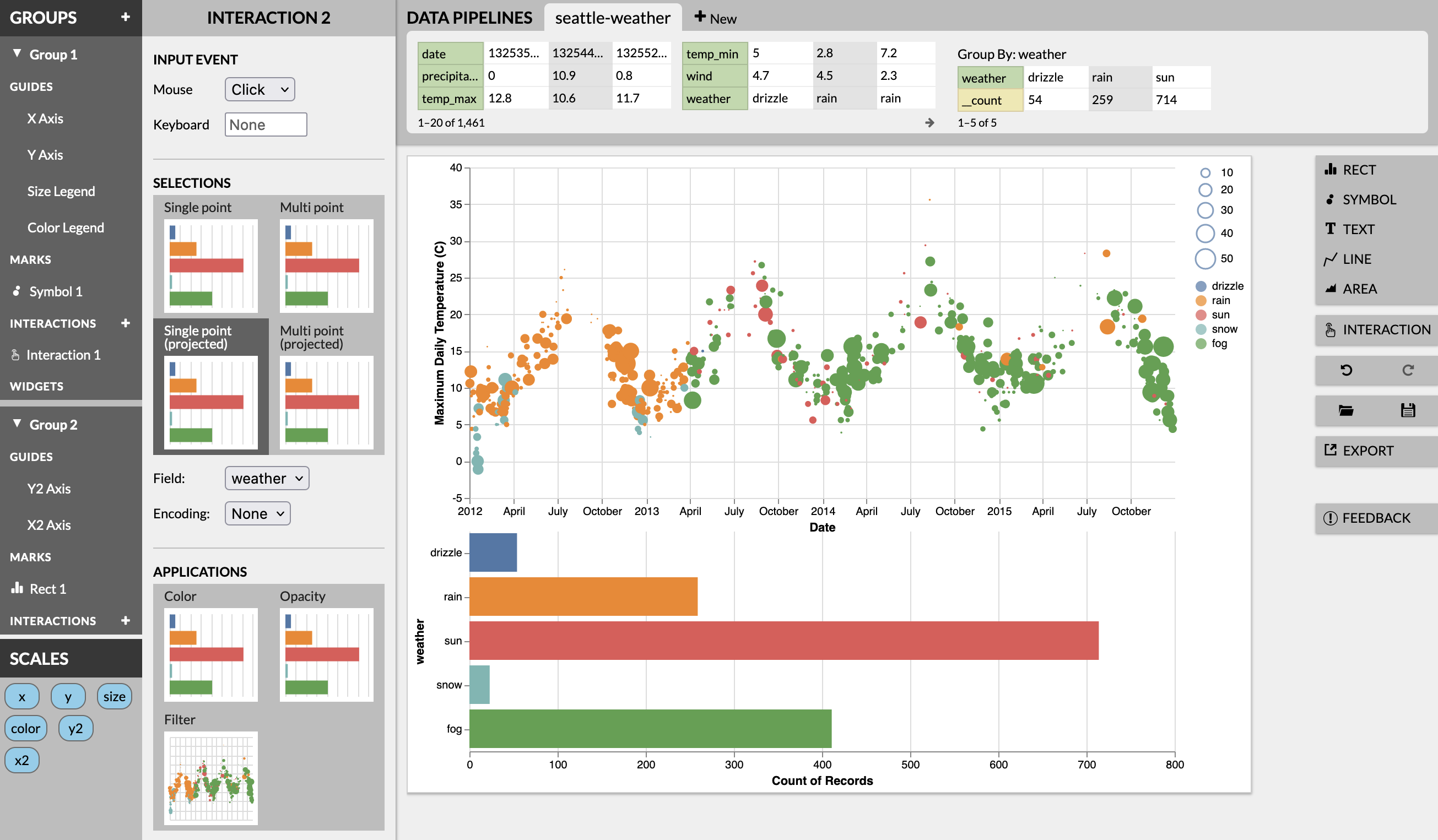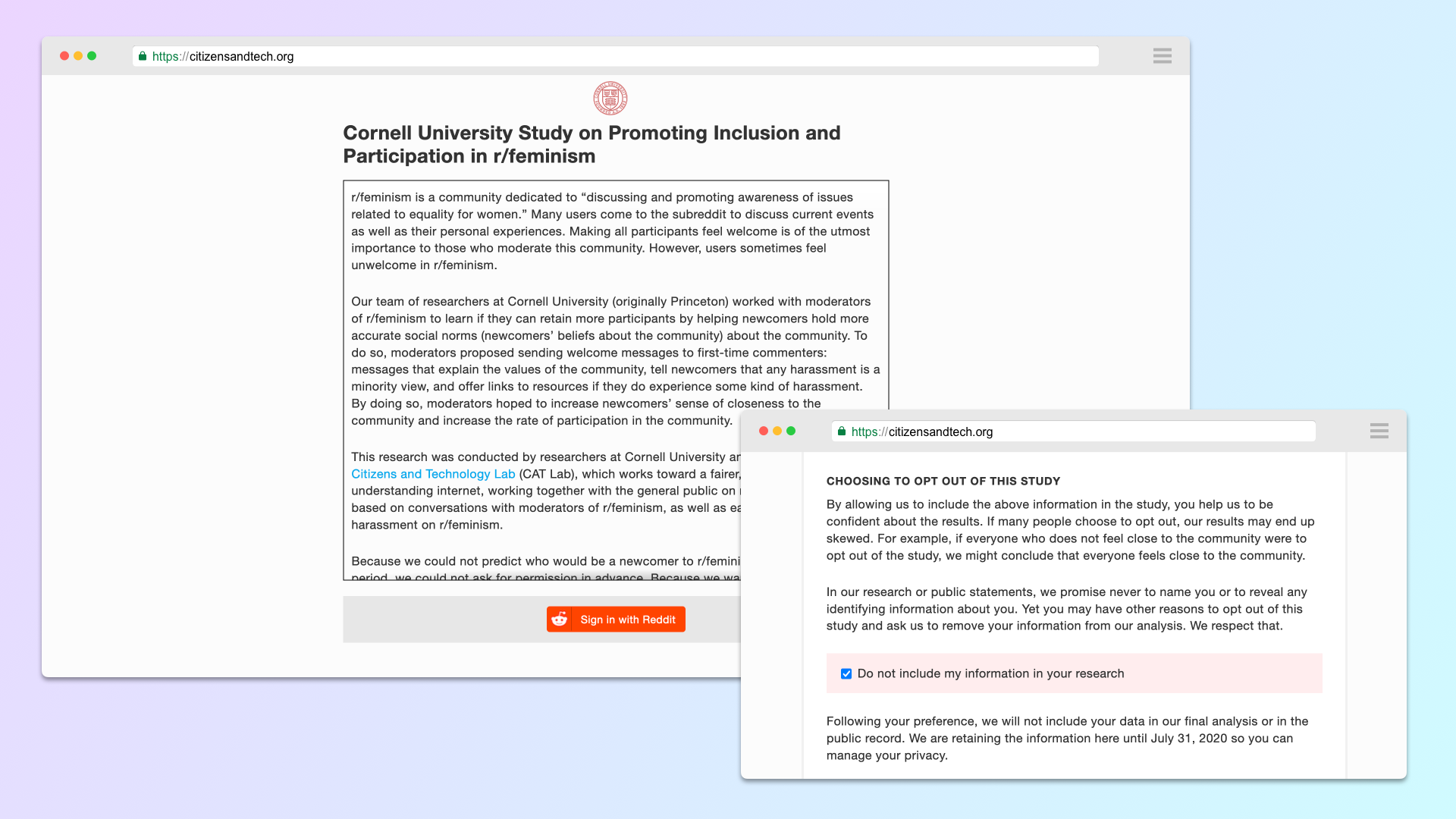Trained as a computer scientist and visual artist, I use design to create artifacts that empower marginalized individuals and communities while advancing scholarly conversations about the technical and ethical aspects of building interactive systems.
Accessible Data Visualization

I partner with blind collaborators and study participants to co-design novel interfaces for non-visual data exploration.
These interfaces support the autonomy and agency of blind users to conduct self-guided data analysis and help them establish common ground with sighted users with shared spatial data metaphors.
Publications
Peer-Reviewed Publications
2025.
Tactile Vega-Lite: Rapidly Prototyping Tactile Charts with Smart Defaults.
Mengzhu (Katie) Chen, Isabella Pedraza Pineros, Arvind Satyanarayan, Jonathan Zong.
ACM Conference on Human Factors in Computing Systems (ACM CHI) (Forthcoming).
2024.
Umwelt: Accessible Structured Editing of Multi-Modal Data Representations.
Jonathan Zong, Isabella Pedraza Pineros, Mengzhu (Katie) Chen, Daniel Hajas, Arvind Satyanarayan.
ACM Conference on Human Factors in Computing Systems (ACM CHI).
2024.
“Customization is Key”: Reconfigurable Textual Tokens for Accessible Data Visualizations.
Shuli Jones, Isabella Pedraza Pineros, Daniel Hajas, Jonathan Zong, Arvind Satyanarayan.
ACM Conference on Human Factors in Computing Systems (ACM CHI).
2022.
Rich Screen Reader Experiences for Accessible Data Visualization.
Jonathan Zong*, Crystal Lee*, Alan Lundgard*, JiWoong Jang, Daniel Hajas, Arvind Satyanarayan.
Computer Graphics Forum (EuroVis).
Best Paper Honorable Mention
Workshops, Conferences, Posters, and Demos
2022.
Olli: An Extensible Visualization Library for Screen Reader Accessibility.
Matt Blanco, Jonathan Zong, Arvind Satyanarayan.
IEEE VIS Posters.
Talks & Presentations
Invited Talks
. Accessible Data Representations for Screen Reader Users.
. Designing Data Representations for Embodiment and Refusal.
Conference Talks and Panels
. Olli: Accessible Data Representations for Screen Reader Users.
Interactive Visualization Tools and Abstractions

I design languages and interfaces that allow users to move between static, interactive, and animated data representations, and engage in real-time collaboration.
These tools help users rapidly conduct data exploration using a broad set of spatial and temporal visualization techniques.
Publications
Peer-Reviewed Publications
2023.
Animated Vega-Lite: Unifying Animation with a Grammar of Interactive Graphics.
Jonathan Zong*, Josh Pollock*, Dylan Wootton, Arvind Satyanarayan.
IEEE Transactions on Visualization and Computer Graphics (IEEE VIS).
2021.
Lyra 2: Designing Interactive Visualizations by Demonstration.
Jonathan Zong, Dhiraj Barnwal, Rupayan Neogy, Arvind Satyanarayan.
IEEE Transactions on Visualization and Computer Graphics (IEEE VIS).
2020.
Representing Real-Time Multi-User Collaboration in Visualizations.
Rupayan Neogy, Jonathan Zong, Arvind Satyanarayan.
IEEE Visualization Conference (VIS).
Workshops, Conferences, Posters, and Demos
2021.
Design Spaces of Domain-Specific Languages: Comparing and Contrasting Approaches in PL and HCI.
Jonathan Zong*, Josh Pollock*, Dylan Wootton, Arvind Satyanarayan.
PLATEAU Workshop on the Intersection of HCI and PL.
2020.
Lyra: An Interface for Designing Interactive Visualizations.
Jonathan Zong, Dhiraj Barnwal, Rupayan Neogy, Arvind Satyanarayan.
Computation + Journalism Symposium.
Talks & Presentations
Invited Talks
. Layered Abstractions for Interactive Visualization Design.
Systems and Frameworks for Data Consent and Refusal

I design software that protects the autonomy of research participants online, and develop frameworks to support designers and activists in refusing large-scale data collection by powerful actors.
Bringing together methods from design, empirical social science, and feminist moral philosophy, I develop ideas about consent and refusal by putting theory in conversation with practices that matter to people’s lives.
Talks & Presentations
Invited Talks
. Designing Research Ethics Systems.
Conference Talks
. Data Refusal From Below: A Framework for Understanding, Evaluating, and Envisioning Refusal as Design.
Visual Art on Algorithm Visibility and Embodiment

As a visual artist and critical computing scholar-practitioner, I explore the possibility of combining art and computation to open up space for contingency, embodied knowledge, and speculation as a mode of intervention.
My work often starts from the body as a contested site of control, exploring the way people are asked to conform their bodies to oppressive systems.
Talks & Presentations
Invited Talks
. Art, Concepts, Visualizations.
Conference Talks